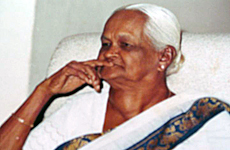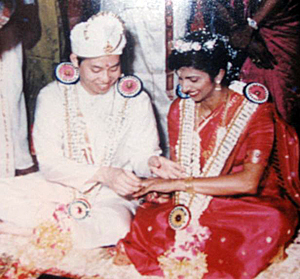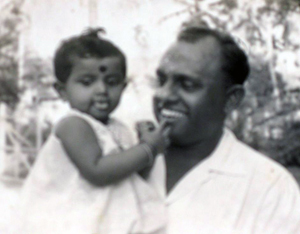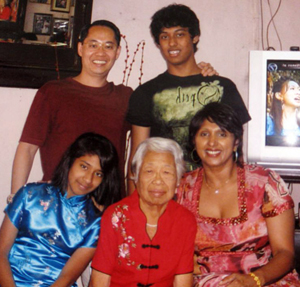
Meera Samanther (all pics courtesy of Meera Samanther)
Meera says advocacy plays an important role in women’s rights. “I realised when I started volunteering that we couldn’t just do band-aid work,” she says. “We also had to advocate for changing the law and the policies. We couldn’t do one without the other.”
The Nut Graph interviewed Meera at her home in Kuala Lumpur on 28 July 2010.
TNG: Where were you born and where did you grow up?
Meera: I was born in Kuala Lumpur in 1959. I lived in Kajang till I was five, and then we moved to Ampang Hilir, as my dad was working as a civil servant with Jabatan Kerja Raya [Public Works Department].
What are your strongest memories of the place where you grew up?

A young Meera with her family
The other big impact in my life is my school, BBGS (Bukit Bintang Girls School). Until today, my primary and secondary school friends still meet up. For our 50th birthdays last year, we organised a two-day event at a hotel, with activities. Friends from all over the world came, it was lovely.
Can you trace your ancestry? How did your parents/grandparents come to Malaysia?

Maternal grandmother
My grandparents came from a village called Tellipillai in Jaffna, Sri Lanka. There was a very strong sentiment, especially from my dad, about our Sri Lankan ethnicity. I was indoctrinated that, “You’re Sri Lankan Tamil. You’re not Indian, you’re Sri Lankan”. There was a kind of snobbish attitude amongst Sri Lankans.
So what was the reaction to your marriage to a Chinese Malaysian?
Oh, good grief. It was blue murder! It was extremely tough. I nearly wanted to pack my bags and leave. My husband was the sane one, he said we’re not getting married under these circumstances, we have to win them over. My dad had passed away so his brother met with my husband to try and “talk sense” into him and dissuade him.

Meera's Hindu wedding ceremony
And then my brothers had a meeting with him and still didn’t succeed in dissuading my husband. So that was it. I told my mother, “I’m getting married on this date”. She started crying but miraculously, the next day, she relented. And since that day, it’s been fine. He won everyone over eventually, especially my brothers.
Are there any stories you hold onto from your family?

Being held by her father
My relatives were in my house all the time. I remember sleeping in the hall with bodies strewn all over. After dinner, my dad would say, “Let’s go buy ice kacang” and we’d all troop out for dessert.
How do you connect to these stories as a Malaysian?
Being Malaysian wasn’t something we thought about much. We didn’t really reflect on what it is to be Malaysian. It was never an issue.

Meera and her husband
But many from my generation keep focusing on what they’re not getting, and instead of fighting for it and claiming it back, they just get into the habit of comparing life elsewhere. People ask me sometimes, “So your child is studying overseas, you wouldn’t mind him living overseas, would you?” I say no, I want him back in this country. I hope he will choose it himself rather than me telling him. This is home. I don’t want them to stay away, not at all.
There’s struggle everywhere and you always think the grass is greener on the other side. […]
Are there any aspects of your identity that you struggle with?
The struggle I had was always having to think I’m Sri Lankan Tamil, in everything I did. I was always told, “When you get married, make sure it’s to a Sri Lankan Tamil.” Most of my relatives married Sri Lankan Tamils — my cousins, brothers. I was the first in my father and mother’s family to marry a non-Sri Lankan, non-Indian. The ball started rolling after that, my cousins said I paved the path for them.
The thing is, I don’t even see my husband as Chinese and me as Sri Lankan Tamil, even though we come from two different cultures. Sometimes, it’s only when we stand side by side in the mirror, then I realise, he’s fairer and he is Chinese.
Describe the kind of Malaysia you would like for yourself and for future generations.
First, I don’t want race-based parties. Can we just go on principle and issues?

Meera with her family and mother-in-law
I want a secular state. I believe and know that Malaysia is a secular state and we should reclaim that. I want the institutions and leaders to claim it and believe it, not just the non-governmental organisations.
On women’s rights — where to begin? We need a sexual harassment and gender equality legislation enacted. I think many still don’t understand what gender equality means and we need that defined in the gender equality legislation. All we have to do is follow the definition in the Convention on the Elimination of All Forms of Discrimination (Cedaw) but the courts, in the Beatrice Fernandez case, failed to do that.

No comments:
Post a Comment